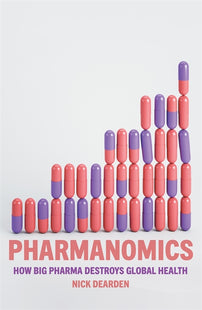Pharmanomics: a Letter from the Editor
One of our October Verso Book Club selections.

For a long time, Big Pharma has been the poster boy for globalised, hyper financialised big corporations that seem driven by rapacious profits over all other considerations. An industry that was created in order to make people well, they have poisoned the well of healthcare for decades.
I don’t need to tell you the story of Purdue and Oxycontin, or of Martin Shrekli who was imprisoned for illegally profiteering when he raised the price of Daraprim by 5,455%. As he said, he did nothing that everyone else does not do everyday! Perhaps you also know the story of how the big pharmaceutical corporations enforced laws so that 4.5 million poor South Africans were refused lifesaving HIV/AIDS medication. It is not a case of bad apples, it is the system that is rotten.
That’s the history, Pharmanomics brings the story to the present day, with a startling expose of what really happened with the global roll out of the COVID 19 vaccines, and why this continues today. It is the riveting excavation of how these big companies work and who they really are. Between 2020-2022 it is not controversial to say that the power to choose between life and death for large swathes of the world’s population was in the hands of (mainly) men whose primary concern was quarterly growth and shareholder satisfaction. The world’s governments could do little about it but jostle to get to the front of the queue and sign the cheques.
One of the first, albeit counterintuitive things I found out working with Nick Dearden, was that Big Pharma is not interested in medicines. It is interested in patents. They do not develop new cures, unless they can see a profit. Work is not calculated by how much suffering can be relieved. Rather than invest in Research and Development, it is cheaper to wait until a publicly-owned, university lab finds a medicine; then buy it up. It will then spend millions on protecting their newly acquired intellectual property, especially in the global south. This is exactly what happened with the COVID Vaccine.
Nick Dearden is a seasoned investigator and campaigner. He has been on the frontline of the globalisation debate for decades with groups such as Amnesty International, War and Want and he was director of the Jubilee Debt Campaign that between 2000-2015 got $130 Billion of debt cancelled held by developing countries. He is now the head of Global Justice Now and has spent the last 5 years campaigning against Big Pharma, and since 2020 has been driving the call for a people’s vaccine.
He looks at the supposed success story of AstraZeneca, Moderna, Pfizer, Johnson & Johnson and shows how they were willing to do deals with London and Washington and the west that were unavailable to the global south. African countries were banned from manufacturing their own vaccines. Instead, they had to pay top dollar for near to expiry samples from the US that took months to arrive. Any attempt to address this problem from charities or the UN were stopped by lawyers and IP warriors like Bill Gates. Who puts profit above the possibilities of everything else?
And what is proven to work in the Global south is usually then returned to the West. the Modern vaccine originally cost $2.80 to make In August 2021 Moderna raised the EU price of their vaccine to $25. In January this year, attempted to raise it to $130.
So what is to be done. Nick is not just interested in pointing out the problems but he comes with solutions too. He will also give credit where it is due. Biden’s recent announcement to regulate the costs of medicines is to be welcomed – but is this too little too late? Is there not a more radical horizon where the sharing of patents between nations based on need rather than the bank balance possible? Pharmanomics is a terrific primer on how we got here, but also sets out possible futures that might just put global health first.
Leo Hollis, Editorial Director
London, September 2023
Pharmanomics: How Big Pharma Destroys Global Health by Nick Dearden is one of our October Verso Book Club reading selections. Find out more about the Verso Book Club here.
